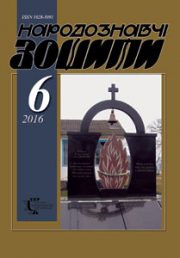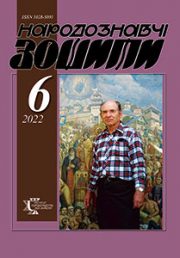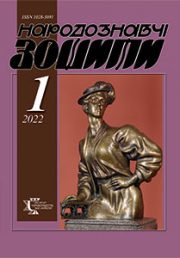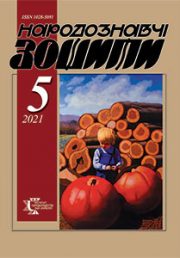The Ethnology Notebooks. 2025. № 5 (185), 1258—1263
UDK398.21:624[:314.151(477.41)1996/1999
DOI https://doi.org/10.15407/nz2025.05.1258
KOVAL Halyna
- ORCID ID: https://orcid.org/000-0002-2998-2357
- Doctor of Philology,
- Acting Head of the Department of Folklore Studies,
- Institute of Ethnology, NAS of Ukraine,
- 15, Svobody Avenue, 79000, Lviv, Ukraine,
- Contacts: e-mail: galyna.kov@gmail.com
Abstract. The article examines the folklore prose of Chornobyl resettlers as an important source for collective memory research. In the centre, there are the records of the oral narratives made by Vasyl Sokil in 1996 and 1998—1999 from the people forcibly displaced from their native land after the Chornobyl nuclear disaster. The aim of the research is to introduce previously unpublished folklore texts reflecting the experience of resettlement into scholarly circulation, as well as to interpret their content. The texts belong to the genre of non-fairytale prose, characterised by concreteness, emotionality, improvisation, stereotyping, and a tendency toward generalisation. The memorates that reflect the tragic events of exile and the loss of home acquire special significance. The key topics can be traced through the narratives: suddenness and disinformation during the evacuation («for three days»), losses and farewells to home, the illusion of temporariness, and existential attachment to the land. The role of the dream as a specific folkloric form that serves as a channel of connection with the destroyed world is analysed. A dream about the church in the home village, documented in the recordings, is interpreted as a metaphor of spiritual emptiness and, at the same time, as a memory that «lives/blooms» despite the loss. The inclusion of materials such as traditional 19th — early 20th-century dreambooks, studies by M. Drahomanov, V. Hnatiuk, I. Franko, F. Kolessa, O. Potebnia allows interpretation of the dreams of Chornobyl resettlers within a broader context of folk symbolism and beliefs. The performed analysis demonstrates that the folklore prose of resettlers performs not only an informative but also a therapeutic function, helping to comprehend the disaster, endure loss, and find meaning in life in a new place. These unique recordings by V. Sokil serve as a kind of «oral archive» preserving the authentic language, worldview, and emotional reactions of witnesses. Such texts are valuable for folklore studies, cultural anthropology, and historical memory, as they reproduce not only the factual chronicle of events but also the profound psychological and symbolic dimensions of exile, resettlement, and non-return. The methodology of the article is based on a systemic-historical approach and methods of analytical interpretation.
Keywords: folklore prose, Chornobyl resettlers, oral history, image of home and village, dream in folk tradition, memory, exile.
Received 30.08.2025
REFERENCES
- Archive of the Institute of Ethnology. F. 1. Op. 2. File 444 (1998—1999). Oral tradition of Polissya resettlers (Collected by V. Sokіl) [in Ukrainian].
- Sokіl, V. (1999). Folk songs of Zelenyi Klyn in the recordings of Vasyl Sokіl. Lviv: Institute of Ethnology, National Academy of Sciences of Ukraine [in Ukrainian].
- Sokіl, V. (2003). Folk prose. Polissya of Ukraine. Materials of historical and ethnographic research. In the interfluve of the Uzh and the Teteriv (1996) (Issue 3, p. 241). Lviv: Institute of Ethnology [in Ukrainian].
- Borysenko, V.Y. (2005). Anthropology of Chernobyl: Socio-cultural aspects of forced resettlement. Kyiv: Institute of Art Studies, Folklore and Ethnology, NASU [in Ukrainian].
- Makhovska, S. (2018). Anthropology of catastrophe: Features of the formation and transmission of historical memory. Historical and Political Studies. Special Issue (Pp. 33—39). Vinnytsia: Donetsk National University named after Vasyl Stus [in Ukrainian].
- Sokіl, V. (2007). Folk tales. Small Encyclopedia of Ukrainian Ethnology (P. 407). Lviv [in Ukrainian].
- Shevchuk, T. (2025). From the field laboratory of dreams: Letters of Kateryna Hrushevska to British anthropologist Charles Gabriel Seligman (from the archives of the Royal Anthropological Institute of Great Britain and Ireland). Folk Art and Ethnology, 2 (406), 9—21 [in Ukrainian].







